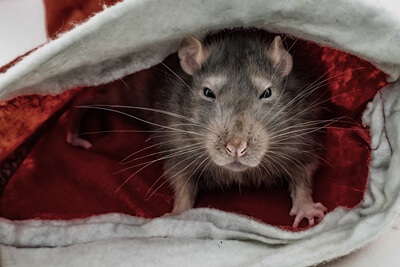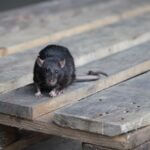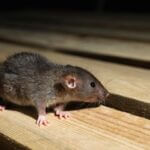Rats are easily scared and flee the moment they spot a human. Even the smell of humans will cause rats to go in the other direction, choosing routes that keep them out of sight.
However, rats have impressive bite strength and can viciously defend themselves against predators.
A rat may attack a human if you corner or attempt to catch them with your bare hands. You may also receive a bite from a mother rat if you disturb her nest and pups.
The motivation for rat attacks on humans is always fear or food.
Rats aren’t hostile creatures, and it’s rare for them to attack someone. However, if they do attack, they’ll likely target the closest body part, such as your hands, arms, feet, or neck.
Clean the wound and contact a doctor immediately if a rat bites you. Infection can lead to disease since rats carry deadly pathogens and bacteria in their mouths.
When Do Rats Attack Humans?
As mentioned, rats are scared of humans and will run away (if they can) when they encounter a person.
Rats understand that humans are larger and stronger than them. Even with their strong bite force, rats aren’t fighters and prefer to flee the scene than confront a predator.
Nonetheless, certain situations may cause a rat to attack you, which is more likely to happen with starving, scared, or cornered rats.
Cornered
Rats have a strong survival instinct that drives them to protect themselves when in danger. Cornering or trapping a rat may cause it to bite as it understands it has nowhere to go.
So, when choosing between fight or flight, it decides to attack.
Attempting Capture
Attempting to capture a rat with your bare hands may provoke it to bite you to defend itself.
Refrain from catching rats with your hands and leave their capture to rodent control experts. That’s why traps, poison, and other pest control methods are preferred.
Asleep
Rats often attack humans when they’re sleeping since this is a time when we’re most vulnerable.
Going to bed without cleaning your hands or mouth might invite a rat to bite you while nibbling lingering food particles. Wash your hands after dinner to eliminate food particles and odor to minimize the risk of rat bites.
Disturbing Its Nest
Most rats will flee if you discover and invade their nest.
However, female rats have a strong maternal instinct that kicks in to protect their nesting young from predators. Attempting to disturb a rat’s nest may cause a rat to attack you to defend her pups.
Are Rats Aggressive to Humans?
High aggression in rats is often linked to increased stress and anxiety.
So, while rats fear humans when cornered or threatened, they can turn combative. Similarly, a female rat may attack anyone interfering with her nest, especially her pups.
Do Rats Chase Humans?
Under normal circumstances, rats don’t chase humans. They’re terrified of humans and will run away whenever they encounter one.
However, rats will attack humans if they feel cornered and have no means of escape. They may also attempt to bite to defend themselves.
Do Rat Jaws Lock When They Bite?
Rats don’t have a locking jaw. However, they still have strong jaws capable of delivering painful bites.
That’s partly because rats possess hard teeth that never stop growing throughout their lifetimes. According to the Mohs scale, rat teeth have a ranking of 5.5.
This scale ranks natural minerals and gemstones according to their hardness on a scale of 1 to 10. Rat teeth are harder than copper, iron, and human teeth, which have a ranking of 5.0.
Rats don’t need to lock their jaws to deliver bites.
Do Rats Jump at Your Throat?
Rats can jump at your throat, although this is a rare event.
The throat area is more difficult for a rat to access. Rats are more likely to attack body parts such as the hands and face area since these tend to be more exposed, especially when you’re asleep.
Do Rats Attack Human Necks?
Rats don’t choose which part of the body to attack. When threatened, they’ll bite the nearest body part to defend themselves.
That said, rats don’t just attack when cornered and afraid. Rats are more likely to bite humans during sleep. Most of the time, rats nibble on your hands, feet, and face. They may also resort to biting your neck if it is exposed.
Do Rats Attack You When You Are Sleeping?
Sleep is the time when you pose the most negligible threat to them. It is common for people to wake up in the middle of the night to find a rat nibbling on their hands, feet, or facial area.
What Happens If A Rat Bites You?
Rats will bite humans when they feel cornered or attacked.
This can happen when you put your hand inside a nest or attempt to catch a rat. While rat bites aren’t always life-threatening, they can become infected or cause rat-bite fever (RBF).
These signs and symptoms will enable you to determine if a rat has bitten you:
- A tiny puncture wound or multiple lacerations.
- Bleeding.
- Redness and swelling.
- Pain.
What To Do When Bitten By A Rat
If you suspect that a rat has bitten you, administer first aid treatment to avoid infection:
- Wash the affected area with soap and warm water to disinfect the wound.
- Next, wipe the area with a clean towel and apply antibiotic cream.
- Cover the wound with a bandage.
Rat bites and scratches can cause serious illness if not treated.
Get a tetanus shot. Your doctor may also prescribe antibiotics to buffer you against infections. As your wound heals, be on the lookout for signs of infection, such as:
- Redness and swelling in the affected area.
- Soft skin that is warm to the touch.
- Throbbing pain.
- Fever.
- Chills.
- Joint pain.
Can You Get Sick From Being Attacked by a Rat?
Rats carry deadly pathogens in their bodies, which can spread to humans through bites and scratches. Rat Bite Fever (RBF) is the most common infection transmitted through rat bites.
This illness is characterized by symptoms such as:
- Fever.
- Chills.
- Joint pain.
- Muscle pain.
- Skin rash.
- Diarrhea.
- Vomiting.
According to Clinical Microbiology Reviews, untreated RBF carries a mortality rate of 10%. Treatment for this infection involves orally administered antibiotics for 7-10 days.
However, more severe cases of RBF may require intravenous antibiotics.
Other illnesses that you can contract from rat bites include:
- Leptospirosis
- Plague
- Salmonellosis
- Hantavirus
How to Avoid Being Attacked by Rats
Rats will seek to avoid any confrontations with you. They will only attack when they’re provoked.
You can exercise caution in the following ways:
Avoid Direct Confrontation
Most rats won’t attack humans unless they feel cornered and threatened.
So, attempting to attack a rat will trigger its survival instinct and increase the likelihood of it biting you to defend itself. To avoid this, don’t directly confront a rat, especially if it has no means to escape.
Don’t Catch a Rat with Your Bare Hands
Attempting to catch a rat agitates it. Even if you manage to catch the rat, it will likely bite your hand to escape. Leave the task of catching rats to rodent control experts.
Avoid Disturbing Rats’ Nests
Rats have strong maternal instincts and will protect their nests, especially if pups are nesting inside.
Disturbing a mother rat’s nest can provoke them to attack to defend their young ones. If you discover a rat nest, don’t disturb it.
Wash Your Hands Before Bed
As discussed, wild rats tend to attack and bite people when they’re asleep. In most cases, they’re attracted by the smell of food that lingers on people’s hands and fingers.
Wash with soap and water before bed to minimize the risk of getting attacked by a rat as you sleep.








